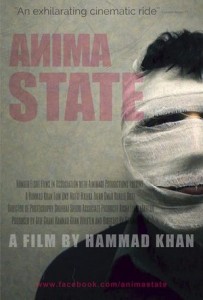 Imagine a man with a bandaged face walking the streets of Pakistan.
Imagine a man with a bandaged face walking the streets of Pakistan.
He has a gun.
He isn’t shy to kill.
He kills – Cold murder in broad daylight.
He hands himself into the police – only to not be taken seriously and told to take a hike.
Is this the state of the world we live in? Where people are getting away with murder in different shapes and forms, and where the truth has little value? Why is he bandaged when he admits his crime? Is he an everyman figure?
This is our introduction to Anima State. Directed by independent film maker Hammad Khan, Anima State will make you shift in your seat – not necessarily uncomfortably, but confusingly. Hammad Khan is bold to make a film stepping away from the conventional mark and to dives deeply into the bizarreness of the human (sub) conscious. Questions provoked: how do we tackle the sub conscious in order to make the world correct? And anyway, what is a correct world? Can the media ever be separate from human beings or are people being turned into Facebook and Twitter at a rate of no return?
The first point to make clear is that the film is unusual – certainly in terms of story line, but also in terms of direction and cinematography. For instance, the romantic, heart wrenching quwalli set against a somewhat mundane chase bringing the scene alive in an unorthodox fashion. The direction is appropriately gritty, as reality is certainly not black and white, nor tidy.
Anima State is a film that is desperately trying to portray the reality of the world. For instance, an element of reality is emphasised through a particular episode with the protagonist looking directly into the camera, addressing the audience. The references to real life past episodes integrated into the story line has an almost haunting effect, suggesting: reality is not rose tinted.
 Why are people wasting their lives away sitting in front of a screen, devoting their lives and their power to the media? Is it an escape? Is it easier to be brainwashed? A puppet?
Why are people wasting their lives away sitting in front of a screen, devoting their lives and their power to the media? Is it an escape? Is it easier to be brainwashed? A puppet?
The deaths suggest a play on being affected by the media and the dying symbolising brainwashing, being made into a conforming zombie. How we see the world and the workings of psychology plays a huge theme in Anima State.
According to a dictionary definition, Anima refers to (freedictionary.com):
1. The inner self of an individual; the soul
2. In Jungian Psychology:
a. The unconscious or true inner self of an individual, as opposed to the persona, or outer aspect of the personality.
b. The feminine inner personality, as present in the unconscious of the male. It is in contrast to the animus, which represents masculine characteristics.
The film explores the definition creatively; in fact during the questions and answers session (London Indian Film Festival), the director described how this film is like a strange sequence of dreams – a factor excellently portrayed throughout the film. There are scenes exploring themes provoking one to think without directly stating how to interpret; there are scenes that leave one utterly lost and wondering: what on Earth was that about?
Anima State is a bold film but one that requires patience: patience to understand it. Filled with symbolism, the film offers much to digest. A second or third viewing would perhaps make Anima State more decipherable. However, the film is let down by the excessive length and a weak ending. It is simply too long and begins to feel repetitive, making a second viewing a tedious task.
Anima State pivots on the struggle between honesty and dishonesty, on one hand striving for honesty and on the other asking: Does the truth matter? Isn’t it all right to just tell a story sometimes?
Anima State is worth a watch. However, expect to be confused.









